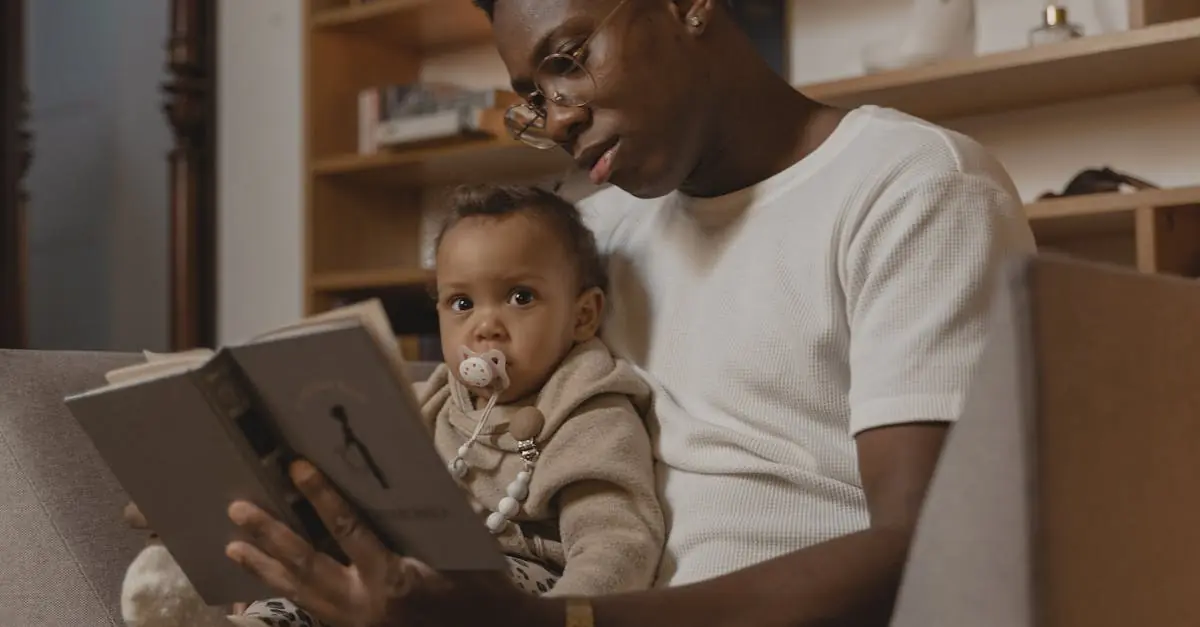Divorce isn’t exactly a walk in the park, especially when kids are involved. It can feel like trying to explain quantum physics to a goldfish. But fear not! With the right approach, you can turn this daunting conversation into an opportunity for growth and understanding.
Kids are resilient, but they also need guidance. It’s crucial to deliver the news in a way that’s honest yet age-appropriate. Think of it as a delicate dance—one that involves a bit of humor to lighten the mood and a whole lot of love to keep them grounded. By tackling this topic with care, parents can help their children navigate this challenging time, ensuring they feel secure and supported. So grab a cup of coffee, take a deep breath, and let’s dive into how to have that all-important chat about divorce.
Table of Contents
ToggleUnderstanding Divorce
Divorce represents the legal dissolution of a marriage, often involving emotional and logistical complexities. Explaining it to children is vital for fostering understanding and stability during a family transition.
What Is Divorce?
Divorce marks the legal end of a marriage between spouses. This process involves filing legal documents and may require court appearances. Couples may choose divorce for various reasons, including irreconcilable differences and a breakdown of communication. The implications extend beyond legal terms; emotional impacts affect all family members, particularly children. Children need clarity about what divorce means for their daily lives, living arrangements, and relationships with both parents.
Common Reasons For Divorce
Common reasons for divorce include lack of communication, financial struggles, and infidelity. These factors often lead to resentment and emotional distance. Changes in priorities may also contribute; as individuals evolve, couples might find themselves incompatible. Stress from external pressures, such as work or family issues, frequently exacerbates relationship tensions. Each of these reasons plays a significant role in the decision to separate, shaping the dynamics of family life during the transition.
Preparing Yourself
Preparing for the conversation about divorce involves several key aspects. Understanding personal feelings helps establish a strong foundation for the discussion.
Reflecting On Your Feelings
Acknowledging emotions is essential. Feelings range from sadness to relief and can change over time. Parents should identify emotions and how they impact behavior. Taking time for self-reflection enhances emotional clarity. Considerations about the future also shape these feelings. Discussing concerns with a trusted friend or therapist can provide perspective. Ultimately, recognizing one’s feelings helps in communicating effectively with children.
Timing and Environment
Selecting the right time and place is critical. Choose a calm, private setting to avoid distractions. Ensure that both parents can participate if possible. Timing should fit children’s schedules, ideally when they feel less stress. Schedule the discussion when emotions are managed, not during heightened conflicts. Comfortable environments promote openness and ease. Proximity to familiar settings, like home, might help children feel secure. Setting the right atmosphere contributes significantly to a supportive conversation.
Telling Your Kids
Talking to kids about divorce requires careful thought and sensitivity. Parents must frame this conversation to nurture understanding and security.
Choosing The Right Time
Selecting an appropriate moment is essential. Avoid times filled with distractions or stress. Early evenings or weekends may provide a peaceful atmosphere. Ensure the children feel relaxed and open to dialogue. When possible, pick a quiet space where they can express themselves freely. A calm environment fosters emotional safety, which encourages candid discussions.
How To Start The Conversation
Opening this conversation can set a positive tone. Parents might begin with a simple statement, like, “I need to share something important.” It’s crucial to keep the message clear yet gentle. Providing context helps children understand why this conversation matters. Parents can follow up with phrases that emphasize love and reassurance, such as “You are safe and loved.” This approach establishes a foundation for healthy communication while addressing their concerns.
Addressing Their Emotions
Acknowledging children’s feelings is vital in this discussion. Kids may experience sadness, confusion, or anger when learning about divorce. Parents should validate these emotions by saying, “It’s okay to feel upset.” Encouraging kids to share their thoughts allows for a more in-depth understanding of their feelings. Parents can help children articulate their emotions by asking open-ended questions, fostering a supportive environment. Active listening builds trust and shows children they can express themselves without fear.
Answering Questions
Children may have a range of questions about divorce. Understanding their curiosities helps in addressing concerns effectively.
Common Questions Kids May Ask
Kids frequently wonder why the divorce is happening. They might ask about living arrangements, questioning where they’ll stay and with whom. Questions about family gatherings arise as well, such as whether both parents will still be involved. Concerns about feelings of guilt may surface. Children often fear that they are to blame or that they could have prevented the situation. No question is too small; every inquiry deserves attention and care.
Providing Honest Answers
Honesty forms the foundation of trust. Parents should provide clear responses, ensuring the information aligns with the child’s age. While it’s vital to be truthful, sharing details should remain appropriate. If discussing reasons, focus on relationship dynamics instead of placing blame. Affirming feelings is crucial; children must know that their emotions are valid and acknowledge their pain. Open dialogue promotes emotional safety, allowing children to express fears and uncertainties comfortably.
Supporting Your Kids
Supporting children during a divorce involves fostering a safe environment for discussion and emotional expression. Parents play a critical role in reassuring kids that they are not alone in this journey.
Encouraging Open Communication
Open communication ensures children feel heard and understood. Parents must create opportunities for their kids to share feelings, fears, and questions. Listening attentively promotes trust and reduces feelings of isolation. By validating their emotions and providing thoughtful responses, parents help children process their experiences. Regularly checking in allows kids to express any emerging concerns. Maintaining an ongoing dialogue encourages kids to feel comfortable discussing their emotions, further strengthening the parent-child bond.
Resources For Kids
Several resources offer support for children facing divorce. Books specifically meant for kids address feelings and provide strategies for coping. Support groups allow children to connect with peers experiencing similar situations. Websites provide helpful articles, interactive activities, and forums for parents and children alike. Professional counseling offers personalized support and coping strategies during difficult times. These resources can empower kids to navigate their feelings while promoting resilience and emotional well-being. By utilizing available resources, parents can further assist their children in adjusting to the changes in their family dynamics.
Navigating the conversation about divorce with children is undoubtedly challenging but essential. By approaching this topic with honesty and sensitivity parents can create a supportive environment that fosters understanding and emotional resilience. It’s crucial to reassure children that they are loved and that their feelings are valid throughout this transition.
Encouraging open dialogue and being receptive to their questions will help children process their emotions and adapt to the changes in their lives. Utilizing available resources can further aid in their emotional journey. Ultimately, with care and thoughtful communication, parents can guide their children through this difficult time, helping them feel secure and understood.




